一般将来时 知识点
一般将来时语法知识点
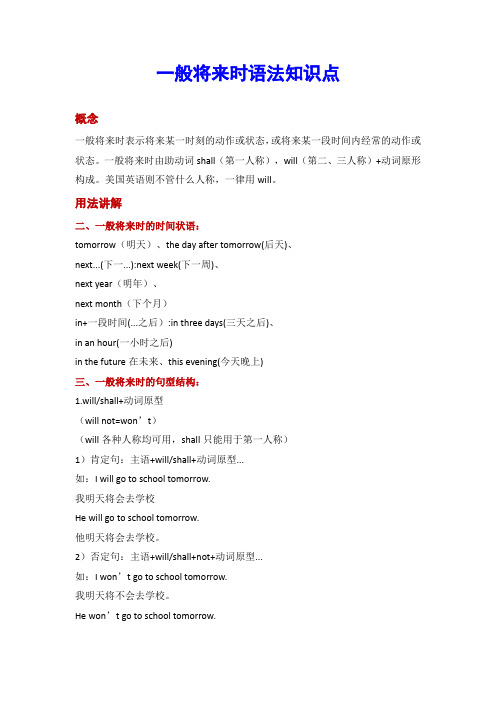
一般将来时语法知识点概念一般将来时表示将来某一时刻的动作或状态,或将来某一段时间内经常的动作或状态。
一般将来时由助动词shall(第一人称),will(第二、三人称)+动词原形构成。
美国英语则不管什么人称,一律用will。
用法讲解二、一般将来时的时间状语:tomorrow(明天)、the day after tomorrow(后天)、next...(下一...):next week(下一周)、next year(明年)、next month(下个月)in+一段时间(...之后):in three days(三天之后)、in an hour(一小时之后)in the future在未来、this evening(今天晚上)三、一般将来时的句型结构:1.will/shall+动词原型(will not=won’t)(will各种人称均可用,shall只能用于第一人称)1)肯定句:主语+will/shall+动词原型...如:I will go to school tomorrow.我明天将会去学校He will go to school tomorrow.他明天将会去学校。
2)否定句:主语+will/shall+not+动词原型...如:I won’t go to school tomorrow.我明天将不会去学校。
He won’t go to school tomorrow.他明天将不会去学校。
3)一般疑问句:Will/Shall+主语+动词原型...如:Will you go to school tomorrow?你明天要去学校吗?Will he go to school tomorrow?他明天要去学校吗?肯定回答:Yes,主语+will.如:Yes,I will.Yes,he will.否定回答:No,主语+will+not.如:No,I won’t.No,he won’t.4)特殊疑问句:特殊疑问词+will/shall+主语+动词原型... 如:What will you do tomorrow?你明天将会做什么?What will he do tomorrow?他明天将会做什么?2.be going to+动词原型1)肯定句:主语+be going to+动词原型...如:I am going to buy some books tomorrow.我明天打算去买一些书。
最新一般将来时知识点(大全)
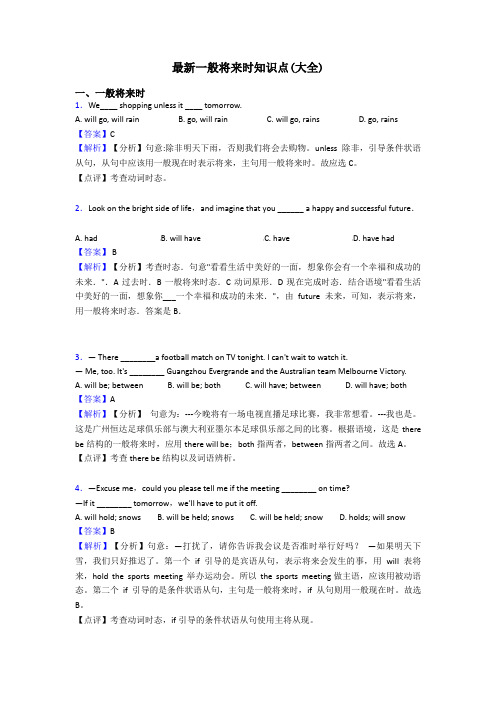
最新一般将来时知识点(大全)一、一般将来时1.We____ shopping unless it ____ tomorrow.A. will go, will rainB. go, will rainC. will go, rainsD. go, rains【答案】C【解析】【分析】句意:除非明天下雨,否则我们将会去购物。
unless 除非,引导条件状语从句,从句中应该用一般现在时表示将来,主句用一般将来时。
故应选C。
【点评】考查动词时态。
2.Look on the bright side of life,and imagine that you ______ a happy and successful future.A. hadB. will haveC. haveD. have had【答案】 B【解析】【分析】考查时态.句意"看看生活中美好的一面,想象你会有一个幸福和成功的未来.".A过去时.B一般将来时态.C动词原形.D现在完成时态.结合语境"看看生活中美好的一面,想象你___一个幸福和成功的未来.",由future未来,可知,表示将来,用一般将来时态.答案是B.3.— There ________a football match on TV tonight. I can't wait to watch it.— Me, too. It's ________ Guangzhou Evergrande and the Australian team Melbourne Victory.A. will be; betweenB. will be; bothC. will have; betweenD. will have; both【答案】A【解析】【分析】句意为:---今晚将有一场电视直播足球比赛,我非常想看。
---我也是。
这是广州恒达足球俱乐部与澳大利亚墨尔本足球俱乐部之间的比赛。
一般将来时知识点
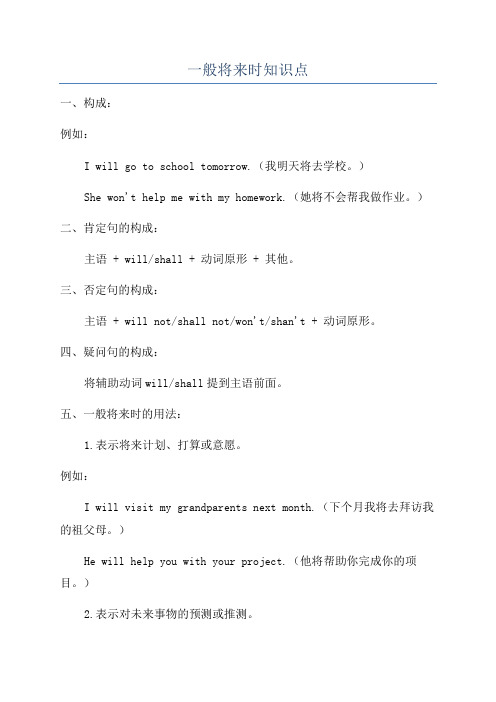
一般将来时知识点一、构成:例如:I will go to school tomorrow.(我明天将去学校。
)She won't help me with my homework.(她将不会帮我做作业。
)二、肯定句的构成:主语 + will/shall + 动词原形 + 其他。
三、否定句的构成:主语 + will not/shall not/won't/shan't + 动词原形。
四、疑问句的构成:将辅助动词will/shall提到主语前面。
五、一般将来时的用法:1.表示将来计划、打算或意愿。
例如:I will visit my grandparents next month.(下个月我将去拜访我的祖父母。
)He will help you with your project.(他将帮助你完成你的项目。
)2.表示对未来事物的预测或推测。
例如:It will rain tomorrow.(明天将会下雨。
)3.表示对将来事件的承诺或约定。
例如:They won't be late for the meeting.(他们不会迟到参加会议。
)4.表示习惯性、定期发生的动作或存在的状态。
例如:He will always watch TV after dinner.(他晚饭后经常看电视。
)They will be in Shanghai next week.(下周他们将在上海。
)5.用于条件句中,表示对未来情况的假设。
例如:If it rains tomorrow, we won't go hiking.(如果明天下雨,我们不会去远足。
)6.用于请求、建议、命令等语气中。
例如:Will you close the window?(请你关上窗户好吗?)You should study harder.(你应该更加努力学习。
)六、一般将来时的时间状语:表示将来的时间状语有:tomorrow(明天)、next week(下周)、in the future(将来)、soon(很快)、later(后来)、next year(明年)等。
一般将来时知识点(大全)(word)
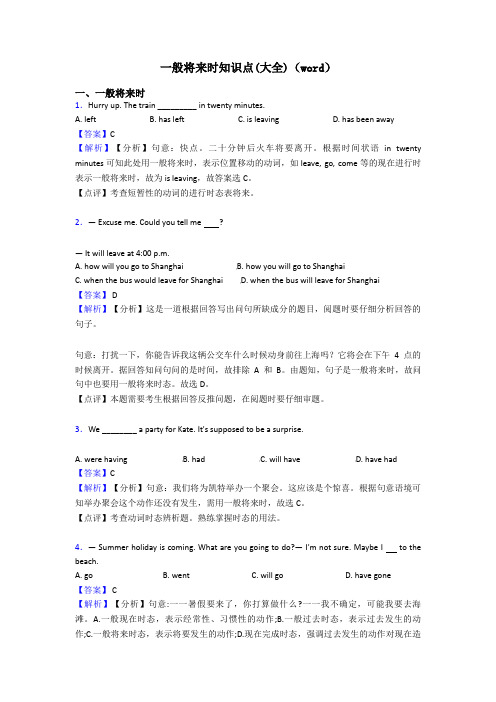
一般将来时知识点(大全)(word)一、一般将来时1.Hurry up. The train _________ in twenty minutes.A. leftB. has leftC. is leavingD. has been away【答案】C【解析】【分析】句意:快点。
二十分钟后火车将要离开。
根据时间状语in twenty minutes可知此处用一般将来时,表示位置移动的动词,如leave, go, come等的现在进行时表示一般将来时,故为is leaving,故答案选C。
【点评】考查短暂性的动词的进行时态表将来。
2.— Excuse me. Could you tell me ?— It will leave at 4:00 p.m.A. how will you go to ShanghaiB. how you will go to ShanghaiC. when the bus would leave for ShanghaiD. when the bus will leave for Shanghai【答案】 D【解析】【分析】这是一道根据回答写出问句所缺成分的题目,阅题时要仔细分析回答的句子。
句意:打扰一下,你能告诉我这辆公交车什么时候动身前往上海吗?它将会在下午4点的时候离开。
据回答知问句问的是时间,故排除A和B。
由题知,句子是一般将来时,故问句中也要用一般将来时态。
故选D。
【点评】本题需要考生根据回答反推问题,在阅题时要仔细审题。
3.We ________ a party for Kate. It's supposed to be a surprise.A. were havingB. hadC. will haveD. have had【答案】C【解析】【分析】句意:我们将为凯特举办一个聚会。
这应该是个惊喜。
根据句意语境可知举办聚会这个动作还没有发生,需用一般将来时,故选C。
四年级一般将来时的知识点归纳
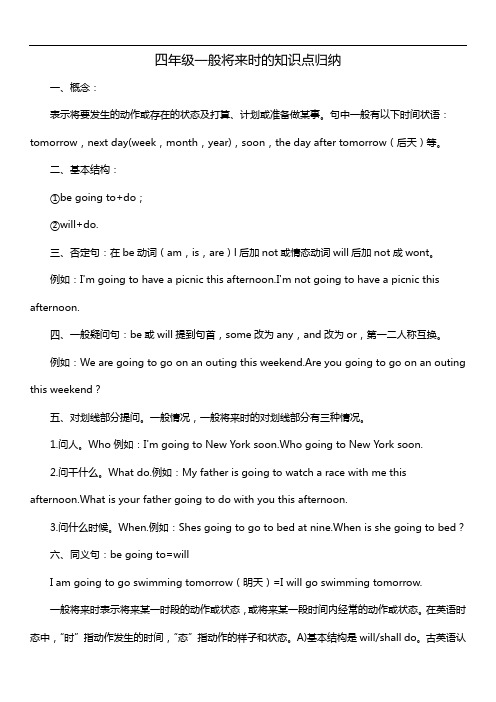
四年级一般将来时的知识点归纳一、概念:表示将要发生的动作或存在的状态及打算、计划或准备做某事。
句中一般有以下时间状语:tomorrow,next day(week,month,year),soon,the day after tomorrow(后天)等。
二、基本结构:①be going to+do;②will+do.三、否定句:在be动词(am,is,are)l后加not或情态动词will后加not成wont。
例如:I'm going to have a picnic this afternoon.I'm not going to have a picnic this afternoon.四、一般疑问句:be或will提到句首,some改为any,and改为or,第一二人称互换。
例如:We are going to go on an outing this weekend.Are you going to go on an outing this weekend?五、对划线部分提问。
一般情况,一般将来时的对划线部分有三种情况。
1.问人。
Who例如:I'm going to New York soon.Who going to New York soon.2.问干什么。
What do.例如:My father is going to watch a race with me this afternoon.What is your father going to do with you this afternoon.3.问什么时候。
When.例如:Shes going to go to bed at nine.When is she going to bed?六、同义句:be going to=willI am going to go swimming tomorrow(明天)=I will go swimming tomorrow.一般将来时表示将来某一时段的动作或状态,或将来某一段时间内经常的动作或状态。
一般将来时知识点

一般将来时一、知识梳理(一)基本用法1.概念一般将来时表示将来某一时刻的动作或状态,或将来某一段时间内经常的动作或状态。
2.构成基本构成句型例句am/is/are going todo肯定句I am going to go fishing next weekend.否定句I am not going to go fishing next weekend.一般疑问句Are you going to go fishing next weekend?特殊疑问句What are you going to do next weekend?will/shall do肯定句I shall/will visit my grandmother on Sunday.否定句I shall/will not(won’t)visit my grandmotheron Sunday.一般疑问句---Will you visit my grandmother on Sunday?---Yes,I will./No,I won’t.特殊疑问句What will you do on Sunday?3.常用时间状语明天下个XX后明天:tomorrow,后面可以加morning,afternoon,evening下个:next,后面可以加week,month,year等XX后:after和in,后面可以加three weeks/months/years这里要注意一下,after后加时间点才表示将来,如after3o’clock。
加时间段表示过去,如after2hours表示过去。
in后加时间段表将来,如in two years。
(二)考点1.will和shall的区别will可用于所有人称,但shall仅表示单纯将来时,用于第一人称I和we,作为will的一种替代形式。
以You and I为主语时通常避免用shall。
如:He will be back soon.他很快就会回来。
一般将来时知识点总结

一般将来时知识点总结使用“will”构成一般将来时时,需要注意以下几点:1.表示自愿、判断或意愿:I will help you with your homework.(我会帮你做作业。
)She will buy a new car next year.(她明年会买一辆新车。
)I think it will rain tomorrow.(我认为明天会下雨。
)2.表示预测、推测或猜测:I think he will pass the exam.(我认为他会通过考试。
)They will probably arrive late.(他们可能会迟到。
)She won't be happy to hear the news.(她不会高兴听到这个消息。
)3.表示意愿、命令或请求:Will you please close the window?(请你关上窗户好吗?)I will do as you say.(我会按照你说的去做。
)Will you marry me?(你愿意嫁给我吗?)使用“be going to”构成一般将来时时,需要注意以下几点:1.表示计划、安排或意图:I am going to visit my grandmother tomorrow.(明天我打算去看望我的奶奶。
)They are going to have a party next week.(他们下周要举办一个派对。
)She is going to start a new job next month.(她下个月要开始一份新工作。
)2.表示根据现在的迹象、征兆或证据做出的判断:Look at those dark clouds. It is going to rain.(看那些乌云,要下雨了。
)He has a bad cough. He is going to be sick.(他咳嗽得厉害,快生病了。
)She is studying very hard. She is going to pass the exam.(她正在努力学习,一定会通过考试。
【英语】一般将来时知识点总结经典
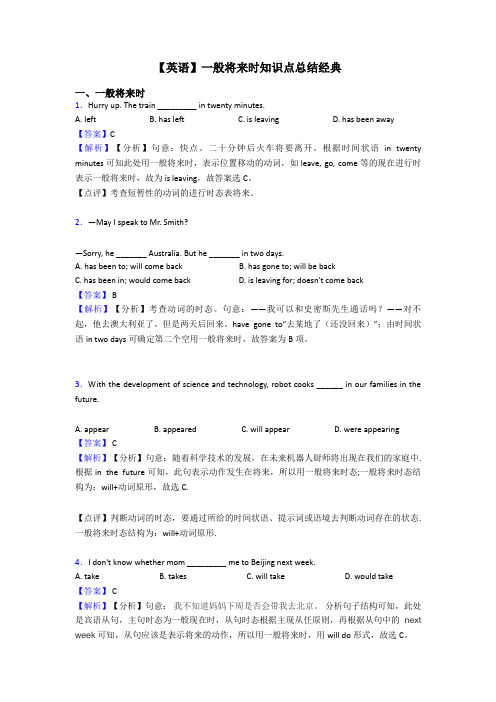
【英语】一般将来时知识点总结经典一、一般将来时1.Hurry up. The train _________ in twenty minutes.A. leftB. has leftC. is leavingD. has been away【答案】C【解析】【分析】句意:快点。
二十分钟后火车将要离开。
根据时间状语in twenty minutes可知此处用一般将来时,表示位置移动的动词,如leave, go, come等的现在进行时表示一般将来时,故为is leaving,故答案选C。
【点评】考查短暂性的动词的进行时态表将来。
2.—May I speak to Mr. Smith?—Sorry, he _______ Australia. But he _______ in two days.A. has been to; will come backB. has gone to; will be backC. has been in; would come backD. is leaving for; doesn't come back【答案】 B【解析】【分析】考查动词的时态。
句意:——我可以和史密斯先生通话吗?——对不起,他去澳大利亚了。
但是两天后回来。
have gone to“去某地了(还没回来)”;由时间状语in two days可确定第二个空用一般将来时,故答案为B项。
3.With the development of science and technology, robot cooks ______ in our families in the future.A. appearB. appearedC. will appearD. were appearing【答案】 C【解析】【分析】句意:随着科学技术的发展,在未来机器人厨师将出现在我们的家庭中. 根据in the future可知,此句表示动作发生在将来,所以用一般将来时态;一般将来时态结构为:will+动词原形,故选C.【点评】判断动词的时态,要通过所给的时间状语、提示词或语境去判断动词存在的状态. 一般将来时态结构为:will+动词原形.4.I don't know whether mom _________ me to Beijing next week.A. takeB. takesC. will takeD. would take【答案】 C【解析】【分析】句意:我不知道妈妈下周是否会带我去北京。
一般将来时知识点
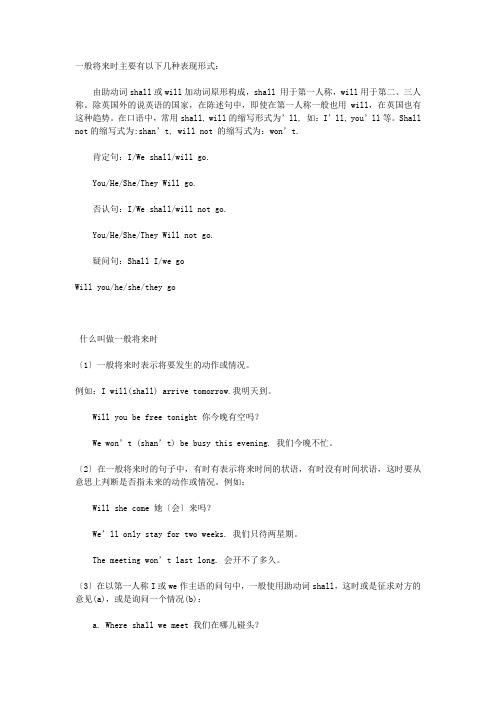
一般将来时主要有以下几种表现形式:由助动词shall或will加动词原形构成,shall 用于第一人称,will用于第二、三人称。
除英国外的说英语的国家,在陈述句中,即使在第一人称一般也用will,在英国也有这种趋势。
在口语中,常用shall, will的缩写形式为’ll, 如:I’ll, you’ll等。
Shall not的缩写式为:shan’t, will not 的缩写式为:won’t.肯定句:I/We shall/will go.You/He/She/They Will go.否认句:I/We shall/will not go.You/He/She/They Will not go.疑问句:Shall I/we goWill you/he/she/they go什么叫做一般将来时〔1〕一般将来时表示将要发生的动作或情况。
例如:I will(shall) arrive tomorrow.我明天到。
Will you be free tonight 你今晚有空吗?We won’t (shan’t) be busy this evening. 我们今晚不忙。
〔2〕在一般将来时的句子中,有时有表示将来时间的状语,有时没有时间状语,这时要从意思上判断是否指未来的动作或情况。
例如:Will she come 她〔会〕来吗?We’ll only stay for two weeks. 我们只待两星期。
The meeting won’t last long. 会开不了多久。
〔3〕在以第一人称I或we作主语的问句中,一般使用助动词shall,这时或是征求对方的意见(a),或是询问一个情况(b):a. Where shall we meet 我们在哪儿碰头?b. Shall we have any classes tomorrow明天我们有课吗?在这类问句中,近年来也有不少人用will,特别是在美国。
例如:How will I get there 我怎么去?〔4〕be going to+动词原形a.表示打算、准备做的事。
一般将来时语法知识点
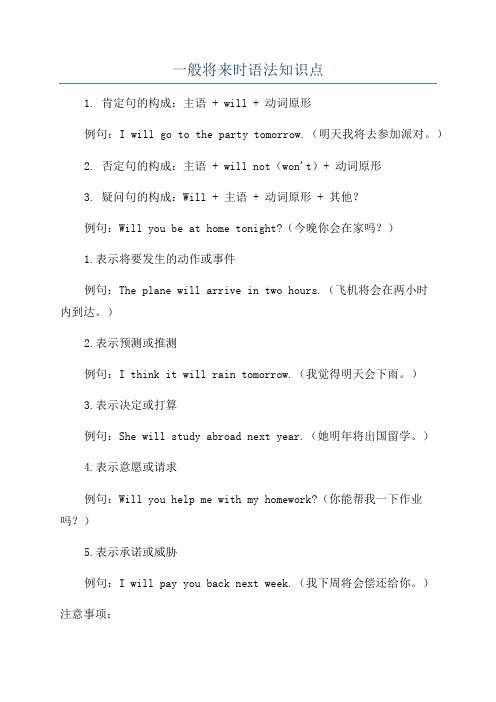
一般将来时语法知识点1. 肯定句的构成:主语 + will + 动词原形例句:I will go to the party tomorrow.(明天我将去参加派对。
)2. 否定句的构成:主语 + will not(won't)+ 动词原形3. 疑问句的构成:Will + 主语 + 动词原形 + 其他?例句:Will you be at home tonight?(今晚你会在家吗?)1.表示将要发生的动作或事件例句:The plane will arrive in two hours.(飞机将会在两小时内到达。
)2.表示预测或推测例句:I think it will rain tomorrow.(我觉得明天会下雨。
)3.表示决定或打算例句:She will study abroad next year.(她明年将出国留学。
)4.表示意愿或请求例句:Will you help me with my homework?(你能帮我一下作业吗?)5.表示承诺或威胁例句:I will pay you back next week.(我下周将会偿还给你。
)注意事项:1.一般将来时用于表示客观事实或不可避免的事情,而不适合用于表示主观意愿或计划。
例句:I will pass the exam.(我一定会通过考试。
)2. 在时间副词或短语中,一般将来时常与表示将来的时间连用,如tomorrow(明天),next year(明年),in two weeks(两周后)等。
例句:He will leave for New York tomorrow.(他明天将动身去纽约。
)3.与一般现在时的区别:一般将来时强调将来的一些时间点或将来发生的动作,而一般现在时则表示现在的状态和经常性动作。
例句:She will meet her friend tomorrow.(她将会明天见她的朋友。
)例句:She often meets her friend for coffee.(她经常和朋友喝咖啡。
一般将来时笔记

一、基本结构主语+will/shall+动词原形:表示将来某个时间将要发生的动作或存在的状态。
主语+be going to+动词原形:表示计划、安排将要进行的动作。
主语+be to+动词原形:表示按计划、安排或命令将要进行的动作。
主语+be about to+动词原形:表示即将发生的动作,意为“即将,正要”。
二、时间状语一般将来时常与一些表示将来的时间状语连用,如tomorrow(明天)、next week(下周)、from now on(从现在开始)、in the future(将来)等。
三、句式变化否定句:在will/shall或be动词后加not。
一般疑问句:把will/shall或be动词提到句首。
特殊疑问句:疑问词+一般疑问句。
反意疑问句:前肯后否,前否后肯。
四、注意事项在条件状语从句中,主句用一般将来时,从句用一般现在时表示将来。
在时间状语从句和条件状语从句中,如果主句是一般将来时,从句通常用一般现在时表示将来。
有些动词,如go、come、leave、start等,可以用现在进行时表示按计划、安排即将进行的动作。
在以here、there开头的句子中,常用一般现在时表示正在发生的动作。
当主语是第一人称时,常用助动词shall表示将来,而不是will。
当主语是第二人称时,通常只用助动词will表示将来。
当主语是第三人称时,既可以用will也可以用shall表示将来。
在某些固定句型中,如“It is+时间+before…”句型中,before引导的时间状语从句通常用一般现在时表示将来。
当句子中有明确表示将来的时间状语时,谓语动词必须用一般将来时。
【英语】一般将来时知识点(大全)

【英语】一般将来时知识点(大全)一、一般将来时1.The kids may not go to school in the future.They____at home on computers.A. have studiedB. will studyC. studied【答案】B【解析】【分析】句意:孩子们将来可以不上学。
他们在家电脑上学习。
A.have studied 现在完成时态,表示已经发生或完成的动作;B.will study即一般将来时态,表示将要发生的动作;C. studied一般过去时态,表示过去发生的动作。
将来在家里、在电脑上学习,用一般将来时态。
故选B。
2.— Let's go fishing if it this weekend.— But nobody knows if it .A. is fine; will rainB. will be rain; rainsC. will be fine; will rainD. is fine; rains 【答案】 A【解析】【分析】句意:——如果这个周末晴天我们去钓鱼吧。
——但是没人知道是否会下雨。
第一个空前的if引导条件状语从句,意思是“如果”,从句中用一般现在时表示将来;第二个空前的if引导宾语从句,意思是“是否”,根据从句的tomorrow可知用一般将来时;故选A。
【点评】考查动词的时态。
3.— I hear your father has gone to Tokyo on business?— Yes. And he _______ in three weeks.A. has returnedB. will returnC. would returnD. returns【答案】 B【解析】【分析】句意:—我听说你父亲出差去日本了?—是的。
他将在三周后回来。
时间状语in three weeks与一般将来时连用,故选B。
一般将来时的知识点归纳整理
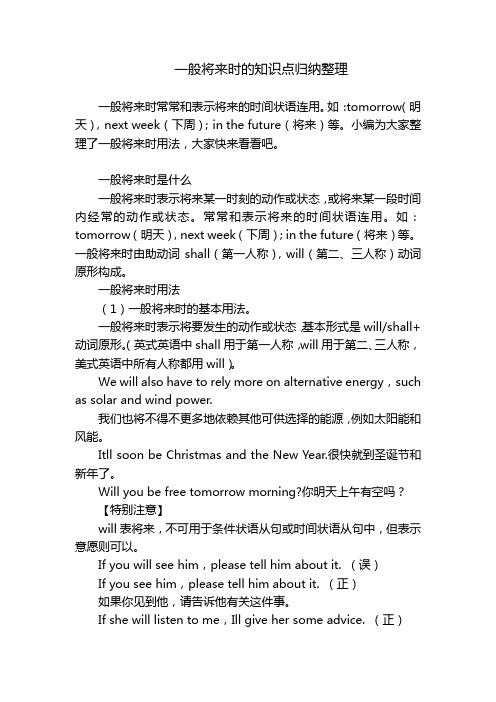
一般将来时的知识点归纳整理一般将来时常常和表示将来的时间状语连用。
如:tomorrow(明天),next week(下周);in the future(将来)等。
小编为大家整理了一般将来时用法,大家快来看看吧。
一般将来时是什么一般将来时表示将来某一时刻的动作或状态,或将来某一段时间内经常的动作或状态。
常常和表示将来的时间状语连用。
如:tomorrow(明天),next week(下周);in the future(将来)等。
一般将来时由助动词shall(第一人称),will(第二、三人称)动词原形构成。
一般将来时用法(1)一般将来时的基本用法。
一般将来时表示将要发生的动作或状态,基本形式是will/shall+动词原形。
(英式英语中shall用于第一人称,will用于第二、三人称,美式英语中所有人称都用will)。
We will also have to rely more on alternative energy,such as solar and wind power.我们也将不得不更多地依赖其他可供选择的能源,例如太阳能和风能。
Itll soon be Christmas and the New Year.很快就到圣诞节和新年了。
Will you be free tomorrow morning?你明天上午有空吗?【特别注意】will表将来,不可用于条件状语从句或时间状语从句中,但表示意愿则可以。
If you will see him,please tell him about it. (误)If you see him,please tell him about it. (正)如果你见到他,请告诉他有关这件事。
If she will listen to me,Ill give her some advice. (正)如果她愿意听我说,我会给她一些劝告。
【考试必备】常与一般将来时连用的时间状语有:next time下次tomorrow明天tomorrow evening明晚before long不久后in the future将来later(on)以后the day after tomorrow后天this afternoon今天下午next year明年(2)一般将来时的其他表达法。
九年义务初中英语一般将来时必考知识点归纳
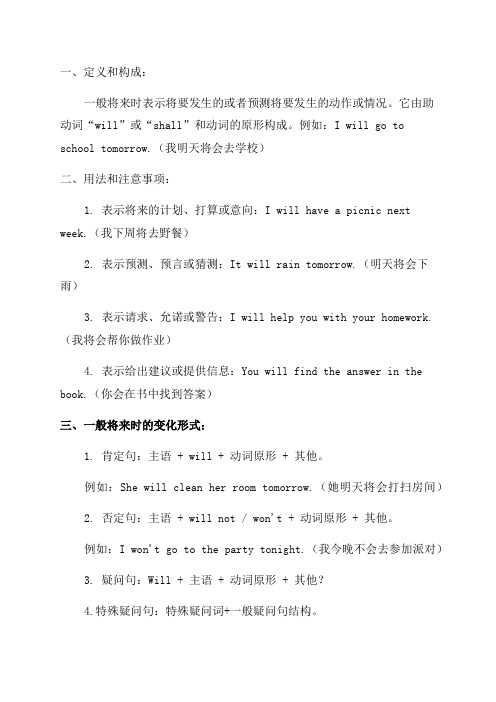
一、定义和构成:一般将来时表示将要发生的或者预测将要发生的动作或情况。
它由助动词“will”或“shall”和动词的原形构成。
例如:I will go to school tomorrow.(我明天将会去学校)二、用法和注意事项:1. 表示将来的计划、打算或意向:I will have a picnic next week.(我下周将去野餐)2. 表示预测、预言或猜测:It will rain tomorrow.(明天将会下雨)3. 表示请求、允诺或警告:I will help you with your homework.(我将会帮你做作业)4. 表示给出建议或提供信息:You will find the answer in the book.(你会在书中找到答案)三、一般将来时的变化形式:1. 肯定句:主语 + will + 动词原形 + 其他。
例如:She will clean her room tomorrow.(她明天将会打扫房间)2. 否定句:主语 + will not / won't + 动词原形 + 其他。
例如:I won't go to the party tonight.(我今晚不会去参加派对)3. 疑问句:Will + 主语 + 动词原形 + 其他?4.特殊疑问句:特殊疑问词+一般疑问句结构。
例如:What will you do this weekend?(你这个周末会做什么?)四、常见的时间状语词:在一般将来时中,我们经常使用时间状语词来指定将来发生动作的时间。
常见的时间状语词包括:tomorrow(明天)、next week(下周)、next month(下个月)、next year(明年)、in the future(将来)、soon(不久)、later(后来)、today(今天)等。
五、常见错误和注意事项:在使用一般将来时时,经常会出现一些错误。
下面是一些需要注意的问题:1. 在肯定句中,不要忘记使用助动词“will”或“shall”。
初中英语知识点总结:一般将来时

初中英语知识点总结初中英语知识点总结 第 1 页 共2 页 初中英语知识点总结:一般将来时(1)一般将来时表示将要发生的动作或存在的状态。
常与表示将来的时间状语连用:tomorrow, next week, next month, in a few days, from now on 。
如。
如I ’m going to visit the museum this Sunday.I ’ll be there in half an hour.We ’ll arrive tomorrow.(2)一般将来时的构成)一般将来时的构成①be going to + 动词原形。
Be 随主语人称和数的变化而变化,否定句在be 后面加not, 疑问句是将be 放到主语之后。
例如:放到主语之后。
例如: It ’s going to be fine tomorrow.He isn ’t going to speak at the mee ng.What are you going to do next?②will +动词原形。
Will 可以和各种人称及数的主语连用。
否定句在will 后加not,缩写成won ’t ,疑问句需将will 提至主语之前。
例如:提至主语之前。
例如: We will have a basketball match next week.Will you come to the party?I son ’t lend it to you.③shall + 动词原形。
此结构常用于主语为第人称I / we 的句中,疑问句表示提建议或征求意见。
如:问句表示提建议或征求意见。
如:When and where shall we meet ?Shall I turn on the TV ?初中英语知识点总结初中英语知识点总结 第 2 页 共 2 页 (3) 一般将来时的基本用法。
一般将来时的基本用法。
① “be going to +动词原形”表示“意图”,即打算、计划要做某事。
- 1、下载文档前请自行甄别文档内容的完整性,平台不提供额外的编辑、内容补充、找答案等附加服务。
- 2、"仅部分预览"的文档,不可在线预览部分如存在完整性等问题,可反馈申请退款(可完整预览的文档不适用该条件!)。
- 3、如文档侵犯您的权益,请联系客服反馈,我们会尽快为您处理(人工客服工作时间:9:00-18:30)。
一般将来时:
1. 定义:将来时间要发生的动作或状态。
2. 两组合 “计划”组合 be(am is are)+going to + “将要”组合 will+动原
3. 时间(常放句尾) this morning 、 this afternoon 、 this evening 、 tonight 、 this Sunday 、 this week 、 this weekend 、this year... tomorrow 、 tomorrow morning 、 tomorrow afternoon 、 the day after tomorrow
next Monday 、 next week next weekend
in the future
4.
What are you going to do tomorrow?
I am going to take a trip tomorrow. 5.
Where are you going?
I am going to the cinema. 6.
When are you going...? I am going there next Tuesday. 7.
How are you going...? I am going there by bike. 8.
Are you going to read books? Yes. I am. / No, I am not. 9. Are we/they going to the park? Yes, we/they are. No, we/they aren ’t. 10. Is she/he going to wash clothes? Yes, she/he is . No, she/he isn ’t.
11. Will we/you/they/he/she go swimming? Yes, ...will. No, ...won ’t. (will not)
12. I am not going to the bookstore this weekend.
13. We/You/They are not going to buy comic books this afternoon.
14. She/He isn ’t going to play football next week. 动词原形(see a film...)
the+地点(cinema...)。
